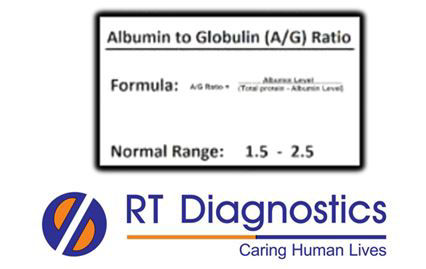TOTAL PROTEIN:
There are two types of protein found in the blood which are albumin and Globulin. This total protein test is also called as Albumin-Globulin ratio (A-G Ratio). This test included in the regular health check-up for diagnosing liver and kidney diseases. When a person feels weight loss or often fatigue, medical professionals would suggest this test.
CLINICAL INFORMATION :
This test is usually done for altered levels of proteins in blood i.e. either in high or low. Hyperproteinemia is seen in patients on a high-fat diet for exercise, dehydration, infection, hepatocellular carcinoma, or multiple myeloma. Symptoms include intestinal discomfort and indigestion, dehydration, exhaustion, nausea, irritability, headache, diarrhea, etc. Hypoproteinemia is seen in conditions due to impaired synthesis, increases utilization by the system, distributional causes, or increased excretion. The causes could be due to infection and inflammation, liver diseases, kidney diseases, malnutrition, or malabsorption. It can lead to complications like hypovolemia and circulatory collapse due to decreased oncotic pressure and/or fluid overload. Symptoms include skin, hair, and nail problems, loss of muscle mass, increased risk of bone fractures, increased appetite and increased calorie intake, risk of infection, fatty liver, restricted growth in children, etc. This test is suggested in patients with symptoms of protein abnormalities reflected in signs and symptoms and in urine causing frothy urine, fluid retention causing swelling, weakness, rapid heartbeat, vomiting, diarrhea, and nausea, etc. Other associated tests include chromatography, colorimetric methods, spectroscopic methods, kit methods, etc.

General instructions:
Sample Requirement: Specimen - Blood sample drawn from the vein. Test Preparation: None.
NOTE - Sample for specimen collections may vary based on the patient’s condition/cases according to the patient’s presenting complaints/signs or symptoms:
SPECIMEN REQUIREMENT (Special or Rare Cases) - As instructed and guided by Physician / Clinician / Pathologist / as per Laboratory’s requirements, according to procedures and protocols.
This Multi-Specialty Clinical Referral Laboratory “RTDIAGNOSTICS” provides precise and accurate tests with an extensive range of testing services to the medical centers to help in the diagnosis and identification of pathology in the test specimens for infectious diseases and also to evaluate the function of organ systems of the patient. It prevents further complications and helps to stabilize and restore health to near normalcy at the earliest without delay.



